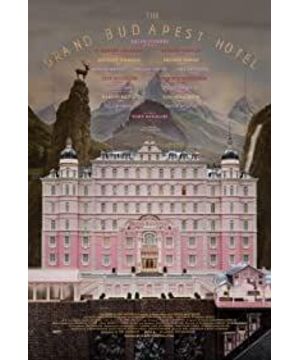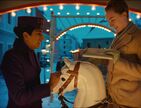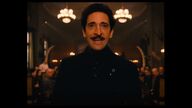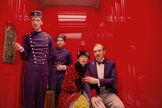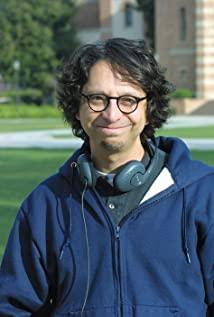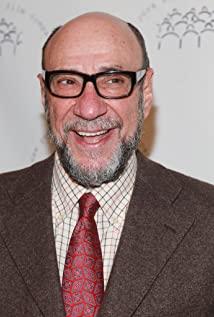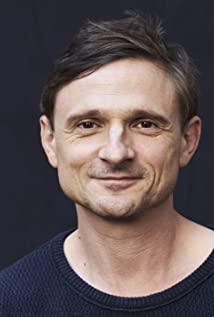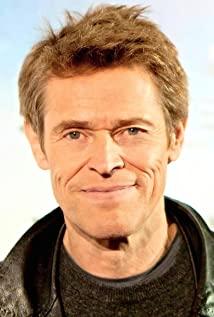I fell in love with this director after watching "MoonriseKingdom". At the time, I probably thought the name of this movie was very strange and I just watched it casually. I always have a strange liking for things with strange names. After watching it, I fell in love with this movie deeply, and then I recommended this movie to people who saw it a few days later. In fact, I basically don't take the initiative to recommend movie music to others, but I really like this movie. As for "Moonrise Kingdom", I have always liked this type of subject matter. It tells cruel stories from the perspective of children. It is a film for adults with a lot of children. It has a strong sense of contrast. (So I also like McDull very much, the story of McDull in the first movie is really cruel.) The deepest impression of "Moonrise Kingdom" to me is the warm yellow tone, which has an unreal feeling, warm and romantic.
(one)
At the beginning of the movie, there is a line of words: please setyour monitor to 16x9. But you will find that the main part of the whole film, in Europe in 1932, the picture is 4:3 ratio, that is, there are two black pieces on both sides of the screen for a long time. Only when the story goes back to 1968 and contemporary times does the picture return to a 16:9 ratio. In addition, Wes Anderson's shots are as distinctive as ever, that is, the camera movement in the film is very little and smooth, and 4: 3's screen is already small. Wes Anderson is making people follow the camera, not the camera following people. It often happens that when the character is moving quickly, the camera does not move or there is very little translation, the character runs out of the camera, then returns to the camera and appears in another place. For example, when Zero leaves Agatha's house from the roof through the chimney, the picture is on the roof, the close-up is Agatha's roof, and the distant view is many roofs. Zero got out of the window, ran to the left and left the frame, and then immediately returned to the frame to appear on the roof in the distant view, showing Zero's rapid movement without the camera moving. Another situation is to let people deliberately enter the picture. For example, when Agatha was discovered by Dmitri in the hotel, Edward Norton put his head into the lower right corner of the picture (it is difficult to find it if you don't pay attention), implying that he was aware of the incident, It paved the way for his subsequent appearance on the sixth floor to stop the pursuit. This gives the impression that it is like watching a drama, the whole scene is not moving, but the characters are moving. It gives an unreal sense of drama. This seems to be an old fashioned way of filming, and with the development of technology, people can now mount cameras on elevators, fast-moving cars, etc., or violently shake them for realism (The Hurt Locker). This is a very modern way of shooting. Wes Anderson deliberately reduced the activity of the shots, and focused on the structure of the content of the picture, which required the construction of the scene to be very delicate, using one storyboard to express what others wanted to express with several storyboards. Exquisite and gorgeous props, symmetrical sets, and absurd to toy-like scenes (cable car, tram up the mountain, observatory monastery on the mountain), he seems to be ingeniously building a stage one by one, giving people a dreamy feeling. In this interesting lens language and dark humor, what happens in this dream world is the destruction of the past life in Europe by war, the invasion of savagery on elegance, cruelty on humanity (two scenes of trains parked in the snow), It's a story of murder, theft, jailbreak, gunfights, gunfights and manhunts.
This personal touch is also present in other Wes Anderson films. For example, the scene where Edward Norton inspects the Boy Scouts at the beginning of "Moonrise Kingdom" is a smooth shot from left to right. There are more camera-free and scene-construction methods in Papa Fox, and it's better to use this method in clay animation, because it also saves a lot of trouble.
(2)
There is another untruth in the content. The story of the film seems to take place in real history, and it also has a distinct era, such as the decline of Europe, the outbreak of war, the occupation of fascism and so on. But among the many realities, this country is a fiction, which is pulling people away from reality.
The entire film is a tribute to the past. The people among them represent life in Europe before the war. Gustave (Voldemort...) was the perfect gentleman at all times, and the most fiery rage at Zero when he first came out of prison was because Zero didn't bring his usual fragrance. His perfume l'air de panache symbolizes his elegance (the perfume that he brought to him thoughtfully when the society of crossed keys helped them, symbolizing his return to the world of elegance. And it was said before that he passed (they also smelled Edward Norton's perfume on the train when they were fleeing), and other Gustave friends, those elegant nobles who were old and dying, Madam.D was murdered, the old gentleman who came to the proclamation of the will can't even figure out the situation. The people among them, even the villains and the use of violence, are elegant. Like Gustave, Zero, Dmitri, Joplin when they fight, you are funny Punch me punch.. the grace of this past life is heading for destruction, war is the last straw to destroy it. Soldiers represent the lack of humanity in the film, and there is Zero when the soldiers appear on the train twice 's narration mentions "the savage slaughterhouse".
The narrative of the film is complex and set in four eras. The beginning is contemporary, a young girl goes to the writer's grave to hang up a bunch of keys, and then sits at his grave reading a book. Then after a narration by the writer in 1985, back to the Grand Budapest Hotel in 1965, where he met the elderly Zero, who told him the story of M. Gustave in 1932 (the subject of the film). After Zero's narration is over and back in 1965, the writer bids farewell to Zero. Finally, going back to the present day, the girl is still reading in front of the tomb.
The film ends with a line: Inspired by thewritings of Stefan Zweig. Interestingly, in addition to marking the year of Zweig's birth and death, it also marked the place where Zweig was born and died. He was born in Vienna and died in a city in Brazil. Zweig and his wife both committed suicide and did not return to Europe, his spiritual homeland. The film is suitable for Zweig. The writer played by Jude Law should be the image of Zweig. Zweig is known to be a mourner of Europe's past.
The narrator in the film, the writer, is clearly a Zweig figure. First of all, the content of the film is very similar to that of Zweig's novels: both are double-layered stories, in which a person tells his own story to a writer, such as "Summer Stories", "The Life of a Woman" Twenty-Four Hours", "Letter from a Strange Woman". In addition, the writer, who was also born in Europe, went to Brazil the day after talking to Zero, never set foot in Europe again in his life, and finally became an elegant mourner of the past Europe. Zweig was expelled by the Nazis, and in the film the writer did not give any reason to leave Europe (1968 was also a sensitive year, I have no educated guess that the reason was Brezhnev brought about by the Prague Spring Heavy pressure on eastern Europe, writers left eastern Europe like other writers like Milan Kundera. But there is no hint in the movie that I haven't seen in other documents, the only thing that matters is the mention of Zero other The property was all nationalized, but that should be common for those old nobles who own castle estates.) The only reason should be that he is "Zweig", so he is going to Brazil. But the strange thing is that his time is very far from Zweig, he is at least a few decades later than Zweig (from the background of the times, it seems that M.Gustave is the image of Zweig). This is interesting, why put another layer on the story?
First of all, I think this gives a sense of narrative. Compared with the direct appearance of the story in 1932, this arrangement gives people a sense of remoteness. The point of the film should not be a static description of that bygone era, but a dynamic presentation of how that era passed, how it was threatened (from war, from later ideologies: fascism and communism), and how it died in this people's persistence in the process. At the end, Zero said that they had never actually entered that elegant world, that world had already died out before them, and they were just clinging to the illusion, a kind of unreality of dreaming. Therefore, the characters in the film are basically not happy.
Secondly, the film deliberately expands the narrative to modern times, as if trying to touch the audience's life. The outermost narrative is contemporary, the writer's burial back to Lutz, and known as the treasure of the nation. People seem to realize their importance after all that grace and humanity has dissipated. But most people have forgotten them, and there is no one in front of the writer's grave. But still someone came to put the keys to the writer's tomb, read his book, The Grand Budapest Hotel, at his grave, in memory of the man who mourned a mourner.
View more about The Grand Budapest Hotel reviews


